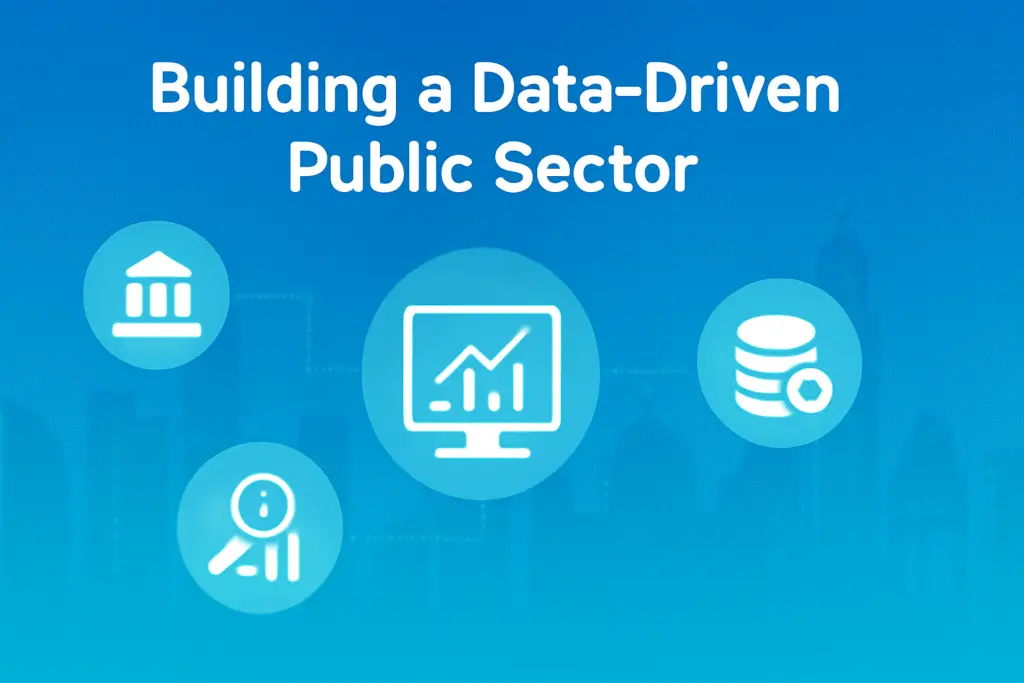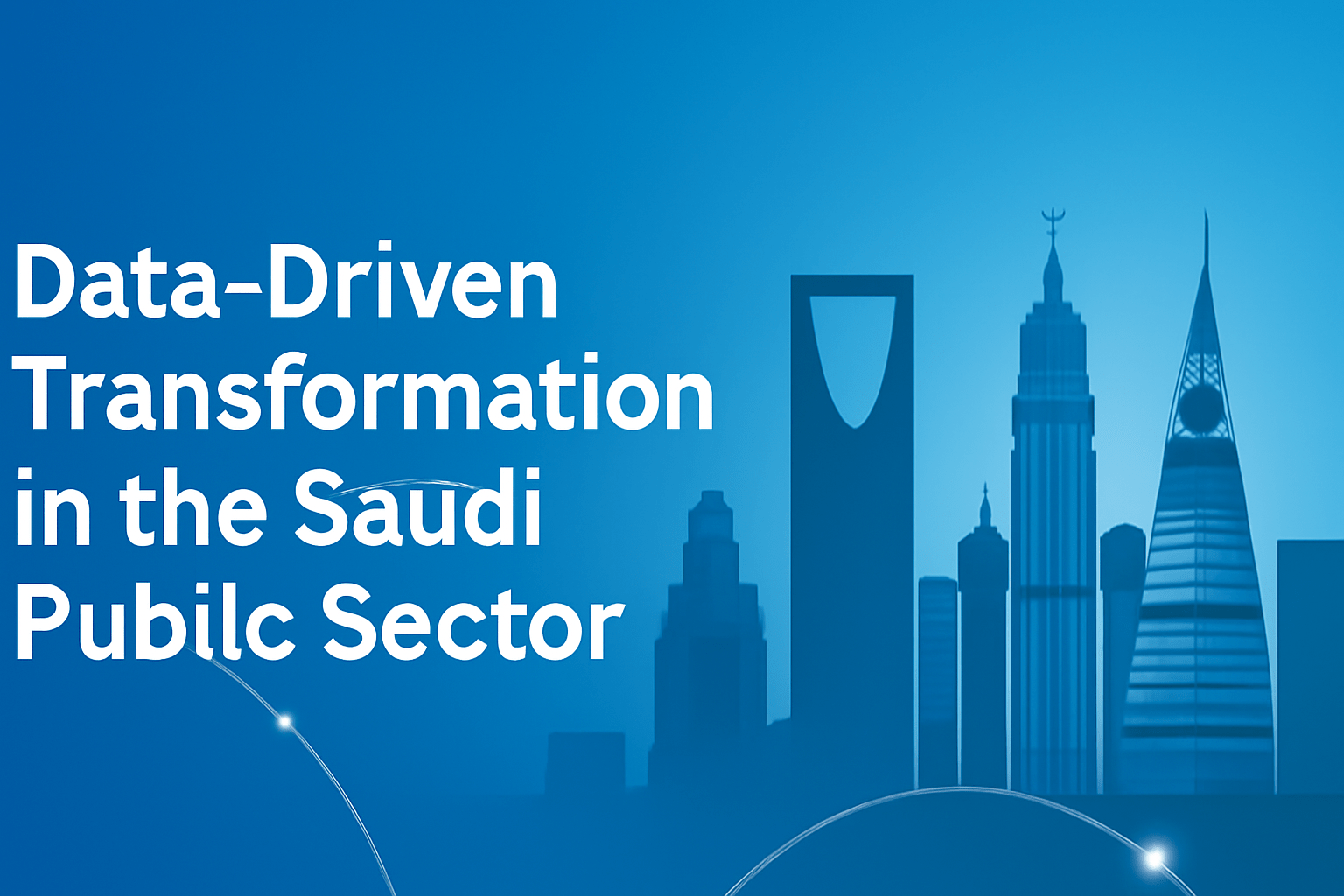Data-Driven Transformation Saudi Public Sector | Vision 2030 & Semantic Brains
In the digital age, data has become a strategic asset that can revolutionize how governments operate, make decisions, and deliver services. Around the world, public sector institutions are undergoing profound changes by adopting data-driven practices. In Saudi Arabia, this transformation aligns directly with Vision 2030—a national roadmap to diversify the economy and modernize the country’s infrastructure and governance.
Data-driven transformation in the public sector is not simply about collecting more data; it involves fundamentally rethinking how government agencies use information to anticipate citizen needs, increase transparency, and improve service delivery. This article explores the role of data in public sector transformation, the enablers and barriers to adoption, global best practices, and the specific strategies Saudi Arabia is implementing to become a digitally advanced and data-literate nation. It also examines how Semantic Brains, a leading AI and analytics firm, is helping to power this transformation.
The Importance of Data in Government Modernization.
Data is the foundation of smart governance. When used effectively, it allows governments to:
- Make evidence-based policy decisions
- Allocate resources efficiently
- Monitor program performance
- Engage citizens transparently
- Detect fraud and corruption
- Improve emergency response
With real-time data analytics, governments can shift from reactive to proactive models of service delivery. For example, instead of waiting for traffic accidents to occur, smart transportation systems can use data to prevent congestion and reduce risks.
Global Trends in Data-Driven Government
Several countries are leading the way in adopting data-driven governance:
- Estonia: Offers digital identity and seamless e-governance with integrated data systems.
- Singapore: Uses data analytics for urban planning, energy efficiency, and public health.
- United Kingdom has implemented open data platforms and centralized analytics units to improve service performance.
- United States: The Federal Data Strategy promotes data sharing and innovation across agencies.
These examples highlight the global shift toward integrated data ecosystems where insights from diverse departments converge to drive coordinated policy-making.
Saudi Arabia’s Vision 2030 and Data-Driven Transformation Saudi Public Sector
Saudi Arabia’s Vision 2030 outlines a clear commitment to digital government, data utilization, and innovation. The key pillars of this transformation include:
- National Data Management Office (NDMO): Sets data governance frameworks across ministries.
- Saudi Data and Artificial Intelligence Authority (SDAIA): Leads data strategy, ethics, and AI innovation.
- Tawakkalna App: Leveraged real-time data to manage public health during COVID-19.
- Open Data Portal: Encourages transparency and public participation through access to datasets.
These initiatives support the broader goals of improving government effectiveness, enabling citizen-centric services, and enhancing economic sustainability.
Building a Data-Driven Public Sector: Key Elements

- Data Governance and Standards Clear data ownership, interoperability protocols, and standardized formats are essential for seamless data sharing across ministries. Saudi Arabia’s NDMO provides classification, quality control, and access rules to ensure consistency.
- Data Infrastructure Cloud computing, data lakes, and centralized repositories support secure and scalable storage of public sector data. Investments in cloud infrastructure, such as the Saudi Cloud First Policy, provide a foundation for analytics and AI.
- Advanced Analytics and AI Machine learning and predictive analytics tools can identify patterns in large datasets to support planning, risk assessment, and decision-making. For example, predictive maintenance powered by AI reduces infrastructure costs.
- Open Data and Transparency: Making public data accessible builds trust and enables citizens, researchers, and entrepreneurs to develop solutions. Saudi Arabia’s Open Data Portal is a key platform for civic engagement and innovation.
- Workforce and Data Literacy A data-driven culture requires skilled public servants who can interpret data and use it in policy-making. Training programs in data science, visualization, and ethical AI are essential.
- Cybersecurity and Privacy Public trust in data initiatives depends on strong protections against data breaches and misuse. Saudi regulations, such as the Personal Data Protection Law, safeguard citizens’ information.
Challenges to Implementation
Despite progress, public sector data transformation faces challenges:
- Siloed Data Systems: Ministries may lack coordination in data sharing.
- Legacy Infrastructure: Outdated IT systems slow down integration.
- Resistance to Change: Cultural shifts take time within bureaucracies.
- Data Quality Issues: Incomplete or inaccurate data hinders analysis.
- Policy Gaps: Rapid tech adoption may outpace regulation.
Saudi Arabia addresses these challenges through central coordination by SDAIA and inter-ministerial task forces, but continued efforts in stakeholder engagement and policy modernization are necessary.
Case Applications of Data in Saudi Governance
- Healthcare: Real-time data helped manage COVID-19, optimize vaccine distribution, and track hospital capacity.
- Transportation: Data from GPS and IoT devices supports smart traffic systems and logistics planning.
- Municipal Services: Data analytics improve waste management, water distribution, and emergency responses.
- Education: Student performance data is used to identify learning gaps and shape curriculum reforms.
- Finance: AI is used to detect tax evasion and optimize budgeting across government departments.
How Semantic Brains Is Supporting Saudi Arabia’s Data-Driven Public Sector.
Semantic Brains is actively contributing to Saudi Arabia’s journey toward a digitally empowered public sector. Their AI-driven solutions and consulting expertise enable ministries and government agencies to harness data for better governance and service delivery.
Key contributions include:
- AI-Powered Dashboards: Semantic Brains builds real-time dashboards that visualize KPIs across departments, enabling leaders to monitor operations, performance, and resource allocation instantly.
- NLP for Document Management: Public sector agencies handle vast amounts of unstructured data—emails, reports, contracts. Semantic Brains uses Natural Language Processing (NLP) to automate classification, summarization, and compliance checks.
- Predictive Analytics Engines: These platforms analyze historical and real-time data to forecast demand for services, identify operational risks, and streamline decision-making. Examples include predictive modeling for healthcare resource allocation or education outcomes.
- Data Governance and Integration: Semantic Brains helps ministries unify fragmented data systems through APIs and integration platforms that comply with Saudi regulatory frameworks.
- Training and Capacity Building: The company also offers workshops and customized training programs for public sector employees to enhance data literacy, ethical AI practices, and visualization skills.
By partnering with government stakeholders, Semantic Brains ensures that AI tools are not only technically sound but also socially aligned and regulatory compliant.
Future Outlook: Toward Cognitive Government
The next phase of public sector transformation in Saudi Arabia will involve cognitive government, where AI, big data, IoT, and blockchain converge to create intelligent, self-improving systems.
- Digital Twins of infrastructure will simulate outcomes before implementation.
- Behavioral Analytics will enable personalized services based on citizen profiles.
- AI Policy Advisors will support evidence-based lawmaking.
- Cross-border Data Diplomacy may arise as Saudi Arabia becomes a regional hub for digital governance.
Conclusion
Data-driven transformation is no longer optional for modern governments—it is imperative. For Saudi Arabia, aligning digital transformation with Vision 2030 creates a once-in-a-generation opportunity to build a public sector that is proactive, inclusive, and future-ready. Semantic Brains continues to support this journey by enabling ethical AI, real-time analytics, and public sector innovation that empowers both citizens and leaders.


